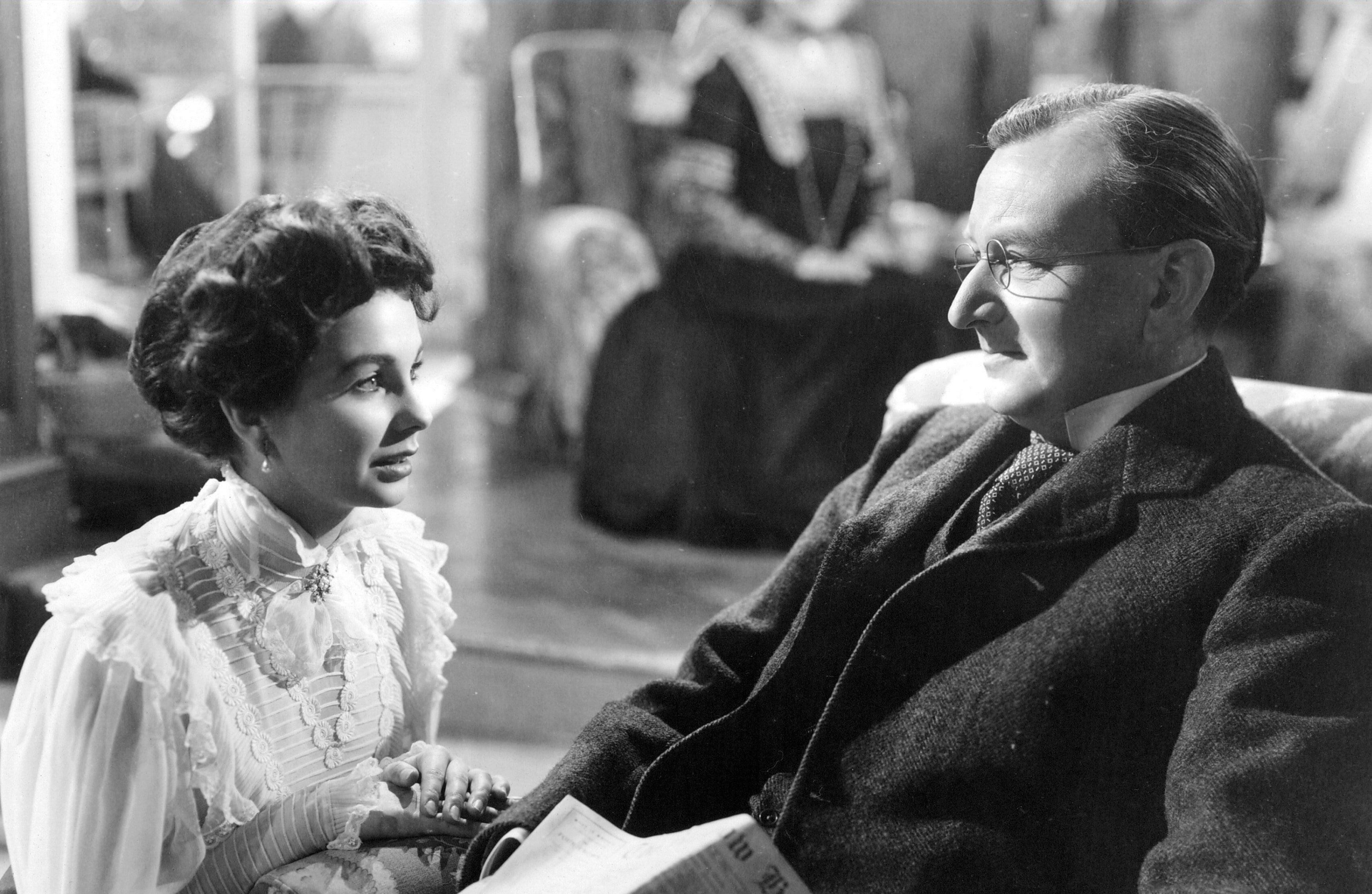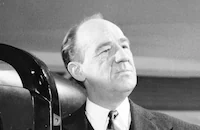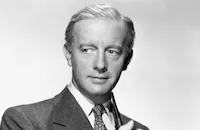Trio

Brief Synopsis
Cast & Crew
James Hayter
Kathleen Harrison
Felix Aylmer
Michael Hordern
Eliot Makeham
Lana Morris
Film Details
Technical Specs

Synopsis
The Verger : 1924 marks Albert Foreman's seventeenth year as the official verger at St. Peter's Church in England. One day in May, the new vicar asks to see him and relays his shock and dismay at his discovery that Albert is illiterate. Albert explains that the previous vicar felt that it was unimportant for Albert to be able to read, and, having been deprived of the opportunity to learn throughout his life, he now feels no compulsion to do so. The vicar fires Albert as a consequence of his illiteracy, and Albert dejectedly returns to his boardinghouse. However, on his walk home, Albert notices that there are no tobacconists in his area, and he tells his landlady, Emma Brown, that he plans to open a shop with his small savings. Albert also proposes to Emma, and they immediately announce the good news to Emma's daughter Gladys, who has just announced her own engagement. The next day, Albert and Emma rent a store space, and within a month, their business is thriving. Some time later, Gladys becomes pregnant shortly before her husband Ted loses his job. Albert insists on opening another shop for them to run, which also becomes successful. Albert later takes great pleasure when Gladys' baby is christened at St. Peter's and, to the vicar's surprise, makes a sizeable donation to the parish. Over the course of ten years, Albert opens ten more shops and becomes a wealthy businessman. One day, Albert goes to the bank to make his regular deposit of the combined income from all his shops, and the bank manager asks to see him. After the manager advises Albert to invest his vast savings, Albert surprises him by explaining that he is unable to select an investment because he is illiterate. When the shocked bank manager asks the prosperous businessman what he would be if he could read, Albert responds that he would be the verger at St. Peter's Church.
Mr. Know-All : With the end of World War II, all ocean liners become heavily booked, and passengers are indiscriminately assigned roommates. To his dismay, mild-mannered Mr. Gray discovers that Max Kelada, a loud, obnoxious and opinionated man with a foreign accent, is his roommate for the voyage to India. Boisterous Kelada, a gem dealer, pushes his way into every social occasion, and Gray soon dubs him a "know-all" because Kelada presumes to be an expert about everything. Kelada even presumes to flirt with Mrs. Ramsay, who has just been reunited with her husband after his two years in the service. One evening, the Ramsays are among the guests invited to join the ship's captain for cocktails. While they are dressing, Ramsay admires his wife's expensive pearl necklace, but she demurs that it is only a cheap imitation which she bought for herself. Ramsay then tells her how he has missed her and vows that he would kill any man who tries to take her from him. At the cocktail party, the captain reluctantly admits that he did not invite Kelada because he irritates everyone, but Kelada shows up uninvited. When the conversation turns to cultured pearls, Kelada insists that he can tell cultured pearls from imitations, and points out Mrs. Ramsay's necklace as "the real goods." Mrs. Ramsay flushes, and her husband, excited by the prospect of humiliating Kelada, bets him that he is wrong. Never one to pass up a challenge, Kelada inspects the necklace, but as he is eyeing the pearls, he sees Mrs. Ramsay's reflection in the mirror. As her stricken face reflects severe distress, Kelada pronounces that the pearls are indeed fakes, and he thereby loses the bet. Later as he is packing to disembark, Kelada receives a note of thanks from Mrs. Ramsay, and Gray surmises that the pearls were real, after all, and that Mrs. Ramsay must have obtained them from a lover. Gray now has new respect for Kelada for sacrificing his own reputation to save another.
Sanatorium : Author Ashenden moves to a sanatorium in Scotland to be treated for tuberculosis, and is prescribed bed rest for the first six weeks of his stay. Ashenden keeps himself entertained by reading, and meets his fellow patients only after his six weeks are up. Among the residents to whom Dr. Lennox introduces him are two elderly spinsters; Campbell, a seventeen-year resident who plays the violin; MacLeod, a sixteen-year resident who has an ongoing chess and music feud with Campbell; Henry Chester, who has become embittered by his illness; and Evie Bishop, a beautiful young woman who has spent the last eight years in different sanatoriums. The spinsters are appalled when they are joined by new patient George Templeton, who has a well-earned reputation as a rake and libertine. George immediately starts flirting with Evie, but she is immune to his advances, which only piques his interest. Henry treats his wife Helen cruelly on her visits because he deeply resents that he is wasting away in a sanatorium while she enjoys good health. Ashenden is sensitive to the situation, and promises Helen that he will befriend Henry. With the arrival of Christmas, the spinsters notice a growing connection between George and Evie, but Evie insists on maintaining a platonic friendship with George. When Helen arrives for her visit, she brings Henry a jar of currants from their garden, and his joy at seeing her is dashed by thoughts of the life he is missing. With the arrival of spring comes George's confession to Evie that he has fallen in love with her, and she allows him to kiss her on the cheek. Henry admits to Ashenden that he has asked Lennox to prohibit his wife's visits, because he cannot stop himself from resenting her. Ashenden, meanwhile, learns that he is one of the lucky few who will soon be cured of the disease. When MacLeod finally wins a game of cards against Campbell, about whose violin playing he has been ranting and raving for months, he becomes over-excited and collapses and dies. MacLeod's death robs Campbell of his spark and he gives up playing the violin. George, meanwhile, proposes to Evie, who finds the idea ridiculous, but reluctantly admits that she is in love with him. The spinsters are horrified by the unlikely romance, and George admits to Ashenden that he never expected to fall in love with "a decent girl." George and Evie consult with Lennox, who advises them that their tuberculosis is incurable, and that George will assuredly die within six months if he marries and tries to live a normal life. Although the prognosis is bleak, both Evie and George decide to live out their remaining days together for a brief chance at happiness, and they marry. The occasion of their wedding prompts Henry to apologize to Helen and stop rebuffing her simply because she is well.

Cast
James Hayter

Kathleen Harrison

Felix Aylmer

Michael Hordern
Eliot Makeham
Lana Morris
Henry Edwards
Kynaston Reeves
Michael Ward
Glyn Houston
Hal Osmond
David Hannaford
Harry Fowler
George Woodbridge

Nigel Patrick

Anne Crawford

Naunton Wayne

Wilfrid Hyde-white
Clive Morton

Bill Travers
Dennis Harkin

Michael Medwin

Jean Simmons

Roland Culver

Michael Rennie
Andre Morell
John Laurie

Finlay Currie
Marjorie Fielding
Mary Merrall

Raymond Huntley
Betty Ann Davies
Andrew Crawford
Shelagh Fraser
Joan Marion
Joan Schofield
David Keir
W. Somerset Maugham
Crew
Arthur Alcott
Ken Annakin
Sydney Box
Maurice Carter
Antony Darnborough
Harold French
Roy Goddard
John Greenwood
David Harcourt
Julie Harris
Harold Haysor
Noel Langley
Muir Mathieson
W. Somerset Maugham
Gordon Mccallum
J. Mitchell
Gerald O'hara
Al T. Partleton
Douglas Peirce
Billy Royle
Alfred Ruome
R. C. Sherriff
C. C. Stevens
The Royal Philharmonic Orchestra
Geoffrey Unsworth
Gill Warrington
Albert Whitlock
Reginald Wyer

Videos
Movie Clip



Film Details
Technical Specs

Award Nominations
Best Sound
Best Sound Editing
Articles
Trio (1950)
The Maugham stories adapted in Trio are "The Verger" (originally published as "The Man Who Made His Mark"), a comedy about a church verger who can't read or write and loses his job, "Mr. Know-All," about an insufferable oaf aboard a posh cruise ship (and based on a real-life experience of Maugham's), and "The Sanatorium," a bittersweet romantic drama set at a Scottish tuberculosis sanatorium. At nearly an hour, it's the longest film in the bunch and was considered as the basis for a full-length feature on its own. The overall cast is uniformly excellent and includes some venerable British players such as Jean Simmons, Michael Rennie, Kathleen Harrison, Nigel Patrick, James Hayter, Roland Culver and Finlay Currie.
The segments in Trio have no connection to one another except for being based on Maugham stories. The only visual link between the tales is in the author himself, who appears on screen to introduce each story. Sitting on the terrace of his Mediterranean villa on a spectacular day, Maugham informally chats directly to the camera for a few moments, coming off as delightfully urbane. Maugham's appearance in these films contributed to his almost rock-star public status at the time. He was being honored, feted, and celebrated all over the world, totally enjoying the fruits of his writerly success.
Trio is the only one of the three films in which Maugham actually had a hand in the screenplay. The others were adapted entirely by other screenwriters. The first two stories in Trio are directed by Ken Annakin, who had also directed a segment in Quartet, while the third is helmed by Harold French, who ended up directing a segment in all three pictures.
There may not be any better anthology films than Quartet, Trio and Encore (though Dead of Night [1945], another great British production, would certainly also make the list). They are thoughtful, concise, and literate yet cinematic, intelligently capturing the essence of Maugham's yarns. And even the slightest segments of the bunch are impeccably produced and acted.
The films did as well in the U.S. as they did in the U.K. The New York Times called Trio "a delightful screen potpourri... shot through with keen, ironic humor and subtle mockery of the stuffier British types... The fine economy of expression is one of the great charms of the whole film. Nothing is obviously labored. This is a mark of the storyteller's art."
Trio was Oscar®-nominated for Best Sound Recording, but lost to All About Eve (1950).
Producer: Antony Darnborough
Director: Ken Annakin (episodes "Mr. Know-All" and "Verger, The"); Harold French (segment "Sanatorium")
Screenplay: Noel Langley, R.C. Sherriff (writers); W. Somerset Maugham (screenplay and stories)
Cinematography: Geoffrey Unsworth, Reginald H. Wyer
Art Direction: Maurice Carter
Music: John Greenwood
Film Editing: Alfred Roome
Cast: James Hayter (Albert Foreman), Kathleen Harrison (Emma Foreman), Felix Aylmer (Bank Manager), Lana Morris (Gladys), Michael Hordern (Vicar), Glyn Houston, Eliot Makeham (Sexton), Henry Edwards (Church Warden), Anne Crawford (Mrs. Ramsey), Nigel Patrick (Kelada).
BW-92m.
by Jeremy Arnold

Trio (1950)
Quotes
Trivia
Notes
The opening title credit appears as follows: "W. Somerset Maugham's Trio." Opening cast credits appear in the following order: Anne Crawford, Roland Culver, Kathleen Harrison, James Hayter, Nigel Patrick, Michael Rennie, Jean Simmons, Naunton Wayne, with Felix Aylmer, Finlay Currie, Betty Ann Davies, Marjorie Fielding, Raymond Huntley, John Laurie, Mary Merrall, Andre Morell, Lana Morris, Wilfrid Hyde White, and Andrew Crawford, Henry Edwards, Shelagh Fraser, Michael Hordern, Eliot Makeham, Joan Marion, Clive Morton, Kynaston Reeves, Michael Ward.
In the film's opening scene, Maugham is shown in a library. A narrator then states the following: "Somerset Maugham once told us that he has never pretended to be anything but a storyteller. It has amused him to tell stories and he's told a great many. Now those of us who helped to make these three into a film are happy once again to pay tribute to a great writer. Here he is to introduce Trio." W. Somerset Maugham then continues: "Well, ladies and gentlemen, if you see me facing you once again in this unaccustomed role for me, you only have yourselves to blame. If you hadn't liked the four stories we told you in Quartet, we shouldn't have been encouraged to show you three more. Of course, we know it's a risk to try to repeat success, and we have to leave it to you to judge if we've been well advised or not." Each segment then opens with an introduction by Maugham, followed by a narrator reading the first lines of the story from a book. The narration is intermittently woven into the stories.
In a contemporary interview with Maugham in New York Times, Maugham stated that he expanded his original story of "The Verger" for the film, and also did some rewrites on portions of the screenplay for "Mr. Know-All" and "Sanatorium." According to news items and the Variety review, the production budget of the film was shared by the J. Arthur Rank Organization and Paramount. Contemporary articles note that the filmmakers were inspired to make Trio after the success of the 1949 British release Quartet, which was also based on W. Somerset Maugham short stories. Trio was nominated for an Academy Award for Best Sound Recording.

Miscellaneous Notes
Released in England August 1950
b&w













